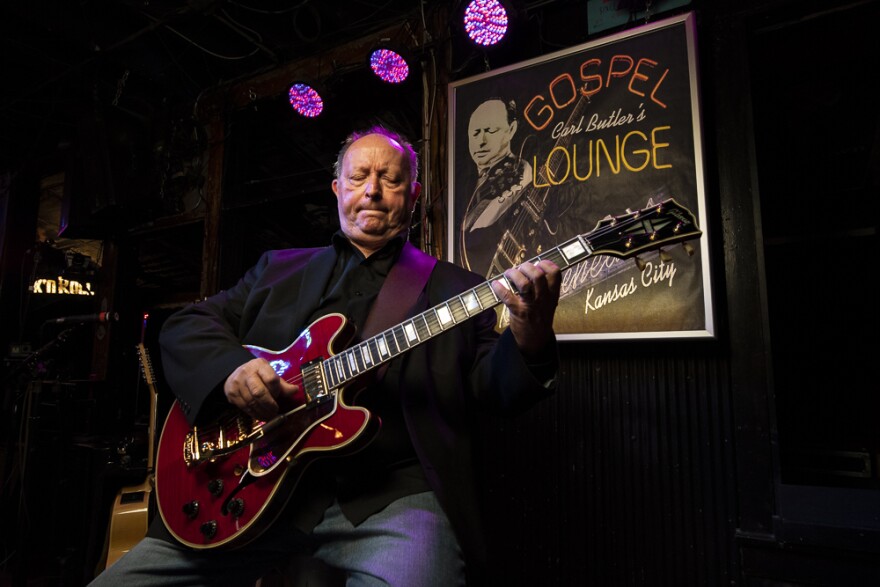Carl Butler can quote chapter and verse of the Bible, but he’s equally comfortable citing "the great theologian" — a country singer named Tom T. Hall — who once proclaimed that "the good Lord likes a little pickin’ too."
Butler is a honky tonk preacher at Knuckleheads, the sprawling roadhouse in Kansas City's East Bottoms. Since he began his ministry 12 years ago, Butler has delivered his blend of party music and heartfelt praise to countless Kansas City bargoers in the 70-seat back room that bears his name: Carl Butler's Gospel Lounge.
He sees no contradiction between the atmosphere and the message.
"If a person's got issues in their life and they need somebody to reach out to them they have way bigger problems than whether or not they're going to have a cocktail," Butler says.
"People go to a place like a Knuckleheads because they're hungry for fellowship," he explains. "I do a chaplaincy work among nightclub musicians, bartenders and waitresses and people who are not turned off by God. They may be turned off a little bit by mainstream church — they may feel awkward or not welcome."
Noting that he's "not the morality police," Butler understands that condemning patrons' lifestyle choices would subvert his mission. "It's supposed to be the good news. I want to put it in a positive light."
Shows on Wednesday usually begin with Butler and his band covering secular songs. Then they segue into gospel material to set the tone for a brief sermon.
"We lower the level of the music down and either my wife Sharon or I give a brief three or four minute talk about life principles and how you can have a relationship with God," he says.
Sets by secular guest artists following the sermon attract music lovers who hadn't previously been exposed to the Butlers' message. Seated amid the teetotalers and drinkers who make up the regular Wednesday night crowd, Butler attempts to make every member of the disparate audience feel equally welcome.
Among the regular attendees is Sara Morgan, a Kansas City based country traditionalist who revives the twangy sound associated with Loretta Lynn. She wrote "Church in a Bar" to honor Butler’s barroom ministry.
Frank Hicks, the owner of Knuckleheads, says Butler's approach is a "perfect fit" for his entertainment complex.
"I'm here with Knuckleheads, he's there with the Gospel Lounge, and it's a great marriage," Hicks says.
Butler comes to his mission naturally. "My mother became a Christian in 1953, the year I was born," he says. As a child, he was obsessed with his father's guitar.
"My dad would go to work and he would say, 'Son, if you take that guitar out of the closet, I'm going to kill you.' Knowing he was a man of his word, he would go to work and I would head for the closet. My sister Janet would go, 'Daddy said, don't take the guitar out of the closet.' And I said, 'I'm not taking it out of the closet!' And so I didn't have enough room to lay it down in (my) lap. So I learned to play it standing up."
His covert self-training paid off.
"I guess by the time I came out of the closet, I could actually play," Butler jokes.
His first paying gig was at Excelsior Springs' Hall of Waters. Butler was 10.
"By the time I was 13 I was playing clubs," he recalls. "At 14, I had a union card and played for an artist named Tex Owens. We traveled around when I was not in school and on weekends. At 15, I started playing six nights a week in a nightclub."
His career took precedence over his spiritual life, but Butler says he "came back to a relationship with God" when he was in his mid-30s.
Hicks knows Butler's impressive musicianship can be persuasive.
"Carl probably could have went anywhere he wanted to and play guitar," he says. "He could have been a session musician. (But) he wants to sit here and play guitar here in this little place back in the back to 70 people and hopefully lead some of them to Christ."
Like Hicks, Morgan believes Butler could have made it big in Nashville.
"We like to call him the most famous person you've never heard of," she says.
Butler reciprocates Morgan's admiration by helping her navigate the complexities of the music industry.
"Carl's a whale, he keeps sharks away," Morgan says. "When you sit down in a meeting, you go, 'This is Pastor Carl Butler — you don't like him, you don't like me.' He's just such a security blanket for me.”
Butler also extols the word of God on Sunday mornings when he and his wife lead a tight-knit fellowship of a few dozen congregants at New Song Christian Fellowship in Gladstone. That atmosphere is homey, but as far as Morgan is concerned, Carl Butler’s Gospel Lounge is hallowed ground.
"I think Jesus might live in there a little bit," she says.
Hicks doesn't disagree.
"One night a guy come in here," he recalls. "He'd gone through a divorce and had a beer back in the back. … I knew him, I said 'Hi' to him."
After the man left that night, he died in a car accident on Interstate 35. Hicks was devastated. "I said, 'I don't know if I want to keep doing this.'" But Butler counseled him, telling him to look at the bright side.
"I said, 'Well, enlighten me — where's the bright side?' He said, 'Well, the bright side is the last thing he heard was the word of God.'"
Butler has no regrets about trading fame and fortune in the music business to answer the call of his barroom ministry.
"I'm still in the music business," he says. "I just changed booking agents."
KCUR contributor Bill Brownlee blogs about Kansas City's jazz scene at Plastic Sax.


